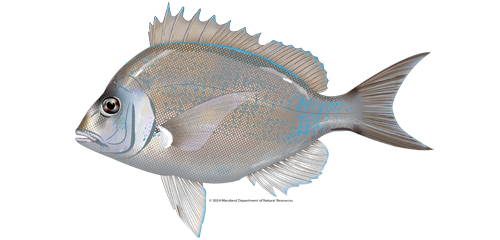| Scup |
 |
Scup |
| Stenotomus chrysops |
(A.K.A. Porgy, Maiden, Fair maid, Ironsides, Northern porgy)
|
Key Distinguishing Markings:
- Scup are deep-bodied (deeper from back to belly than they are wide).
- They are dusky brown with bright silvery reflections below and spiny fins.
- Adult fins are mottled with dark brown, and young scup fins may be faintly barred.
- Scup’s front teeth are very narrow, almost conical, and they have two rows of molars in the upper jaw.
- Longspine porgy look similar to scup, but can be easily identified by the elongated spines on their backs.
|
Distribution:
- Scup undergo an extensive migration between coastal waters in the summer and offshore waters (outer continental shelf) in winter.
- They migrate offshore and south in the fall, returning north and inshore to coastal areas and bays in spring.
- Scup are found in the Northwest Atlantic Ocean, primarily between Cape Cod, Massachusetts, and Cape Hatteras, North Carolina.
|
Size:
- Scup grow slowly, up to about 20 inches long and 4 pounds.
|
Habitat:
- Found to depths of 15m, often inshore in summer, offshore in winter.
|
Spawning:
- Scup are able to reproduce when they reach age 2, when they’re about 8 inches long.
- They spawn over weedy or sandy areas in southern New England from Massachusetts Bay south to the New York Bight from May through August, with peak activity in June.
- Individual scup spawn once a year.
- Most fish spawn at night, but scientists believe scup spawn in the morning.
- Females release an average of 7,000 eggs, which are fertilized externally.
|
Fishing Tips:
- When fishing in shallow water, the fish can be a bit boat shy and the best bite may be several feet behind the boat.
- Keep your chum close, but drop your baits further back to target the biggest fish.
- Always being enough chum and do your best to fish where there is at least some current (to spread the chum).
- If you are catching smaller fish, pick up your anchor and find another spot.
- Drifting can also be effective when trying to find bigger fish. Once they are located, you can consider anchoring and chumming.
|
Fun Fact:
- Scup can live a relatively long time, up to about 20 years.
|
| Family: Sparidae (sea breams and porgies) |
| Order: Perciformes ("perch-like") |
| Class: Actinopterygii (ray-finned fishes) |
References:
- https://neangling.com/recommended-tackle/porgy-tackle/
- http://www.marinespecies.org/aphia.php?p=taxdetails&id=159811
- https://www.fisheries.noaa.gov/species/scup
Illustration by Kevin Ensor, Maryland Department of Natural Resources, Fishing and Boating Services
|
